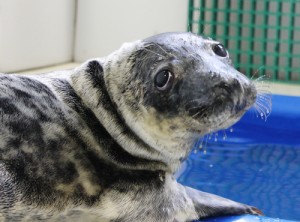
OCEAN CITY — A juvenile grey seal named “Ponyboy,” who was found on the beach in Ocean City on Easter Sunday with a severely injured left front flipper, somewhat reluctantly shuffled out of his crate across the crowded beach and swam into the surf on Wednesday morning.
Ponyboy’s release on Wednesday was the latest in a recent string of releases of injured or ill seals back into the wild after graduating from the Marine Animal Rescue Program’s (MARP) rehabilitation unit at the National Aquarium in Baltimore. On May 23, the MARP crew, led by director Jen Dittmar, released another seal, “Sodapop,” from the beach at Assateague after an extensive rehabilitation program.
On Wednesday, a large crowd gathered in anticipation on the beach just north of the Fishing Pier for the release of Ponyboy and the rehabbed grey seal did not disappoint, although he certainly appeared reluctant to leave the safety of his keepers and the high life he enjoyed at the National Aquarium for the last few months. When MARP staffers opened his crate on the beach, Ponyboy shuffled out, looked around and attempted to go right back in.
MARP staffers attempted to nudge him toward the sea with plexiglass barriers, but Ponyboy was successful in getting back into his crate. MARP staffers lifted the back end of the crate to encourage Ponyboy to move out, which he eventually did. Ponyboy then began a rapid descent down the beach to the waterline before entering the surf and splashing away.
Even after Ponyboy entered the ocean, he still appeared to be not quite ready to leave his recent family and frolicked in the waves close to the shore and looked at times as if he would come back onto the beach. At one point, the young grey seal was spotted in the face of a nice waist-high wave as if he was taking a page out of the book of bodysurfers nearby. After several minutes, however, Ponyboy was seen with his head bobbing now well offshore and his return to the sea was complete.
Ponyboy was admitted for rehabilitation at the National Aquarium on Easter Sunday after being discovered on the beach in Ocean City with a severe injury to his left front flipper and a mild respiratory infection. The cause of the injury is not known, however. The injury healed well with minor surgery and routine wound treatment. Recent X-rays of the affected area showed that the bone had healed with no signs of infection and Ponyboy was using the flipper normally.
According to MARP staffers, grey seal pups present unique challenges during rehabilitation because they often are required to be taught to eat solid food. Grey seal mothers nurse their young for about three weeks, then typically abandon the pups. The pups are then left to learn to eat, navigate and be social. According to Dittmar, Ponyboy was no exception and challenged the staff.
“We were patient through the learning process and supplemented his diet with fish smoothies while he learned,” she said.
In many recent releases, rehabbed seals released back into the wild have been equipped with a tracking device that allows MARP staffers and even curious well-wishers to follow their progress via the National Aquarium’s website. Although Ponyboy had a square patch shaved onto his back, he was not equipped with a tracking device. MARP staffers explained much of their funding comes from donations and grants and equipping a rehabbed animal with a tracking device has become expensive.
According to MARP staffers, Ponyboy was named for one of the lead characters in the novel by S.E. Hinton turned popular 1980s move “The Outsiders.” Incidentally, “Sodapop,” the name of the rehabbed seal released from Assateague in late May is also a character name from “The Outsiders.” A catch line from the book and movie is “stay gold Ponyboy,” which was the prevailing sentiment from the well-wishers that gathered on the beach just north of the Fishing Pier on Wednesday.
